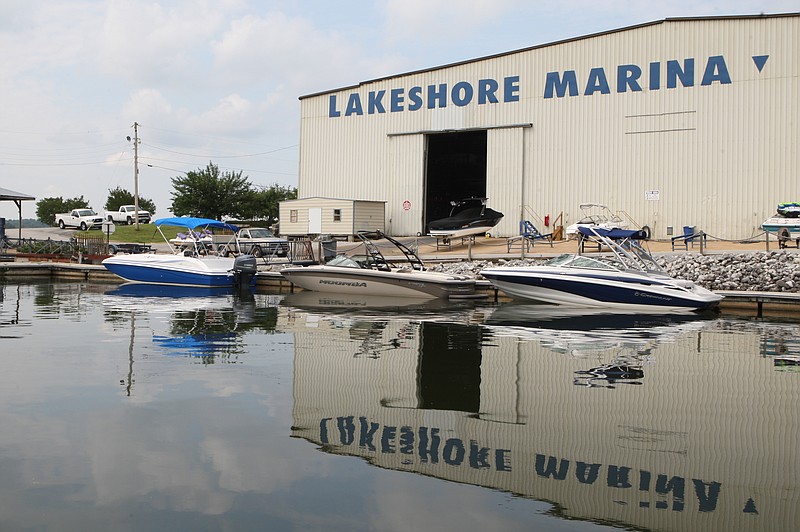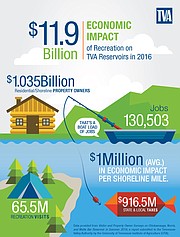The Tennessee Valley Authority was created in 1933 to harness the power of the Tennessee River with hydroelectric dams, flood control and river navigation.
But a new study suggests the 49 reservoirs built by TVA through its network on dams on the Tennessee River have also proven to be an economic powerhouse from lake visitors and property owners using the TVA lakes for pleasure boating, fishing, water skiing and other recreational and entertainment investments.
The University of Tennessee Institute of Agriculture estimates the combination of aquatic recreation and waterfront property along the Tennessee Valley Authority's managed river system last year created $11.9 billion in annual economic impact in the Tennessee Valley - the equivalent of more than $1 million per shoreline mile. Those investments supported an estimated 130,000 jobs.
"This is the first anyone has tried to estimate the total impact from all of the recreational and visitor uses of TVA's reservoirs and, in total, the impact is obviously quite significant from all of those who come to this region or invest in waterfront docks, boats, marinas and hotels," said Neelan Poudyal, an assistant professor at the UT Institute of Agriculture who authored the 222-page study.
Rising tide lifts economy
The economic impact from lake recreational uses and tourism generates an economic impact of :* $1.37 billion on Chickamauga Lake* $758.9 million on Watts Bar Lake* $1.64 billion on Norris LakeSource: UT Institute of Agriculture study on economic impacts of TVA reservoirs

Based upon surveys of visitors and lakefront property owners on three of TVA's reservoirs - Chickamauga, Watts Bar and Norris lakes - Poudyal estimates TVA's lakes draw 65 million visitor days every year and millions of dollars more in spending from property owners who buy boats, docks and make other purchases while spending time on TVA's lakes.
The three reservoirs studied last summer by the UT Institute of Agriculture were chosen to represent urban, rural and tributary reservoir classifications. From that cross-section, the survey data was then extrapolated to cover the entire river system.
"Since its beginnings nearly 84 years ago, TVA's mission has been to improve the lives of those in the Valley, and our integrated river management system is one of the cornerstones of our efforts," TVA Executive Vice President Mike Skaggs said in a statement Monday. "The UTIA study clearly establishes a strong link between the recreational opportunities our reservoirs create and improving the economic opportunities for the 9 million people we serve every day."
First developed to provide flood control, navigation and hydroelectric power, TVA's integrated development plan for the Tennessee River and its tributaries also provides lakes for boating, swimming, and fishing enthusiasts across all seven states in TVA's service area.
Poudyal, who specializes in the study of the human dimensions of natural resource policy, said surveys done last year showed most lake users were well satisfied with TVA lakes and their water quality. The biggest barriers to using the lakes, according to the surveys, had more to do with weather than lake levels or water quality controlled by TVA.
"Considering all the amenities that TVA reservoirs offer, the level of satisfaction among recreational users was relatively high - 75 percent," Poudyal said.
The study estimates TVA lakes helped generate $4.45 billion in labor income and $916 million in state and local taxes.
The UT study did not consider the flood control, navigation and power generating benefits of the Tennessee River for the region.
Last year, TVA also estimates it helped to draw more than $8 billion of capital investment and the creation or retention of more than 72,000 jobs in the Tennessee Valley through its power and economic development programs.
Contact Dave Flessner at dflessner@timesfreepress.com or at 423-757-6340.

